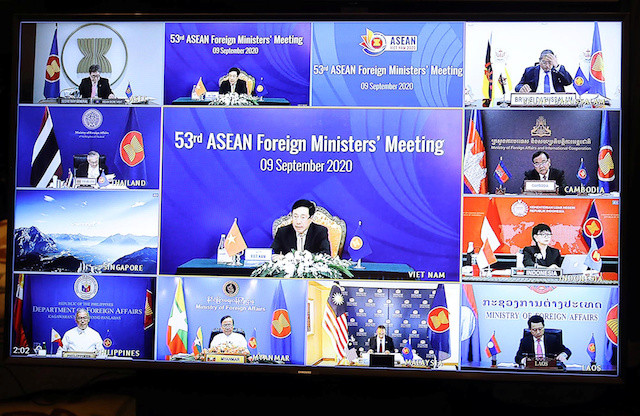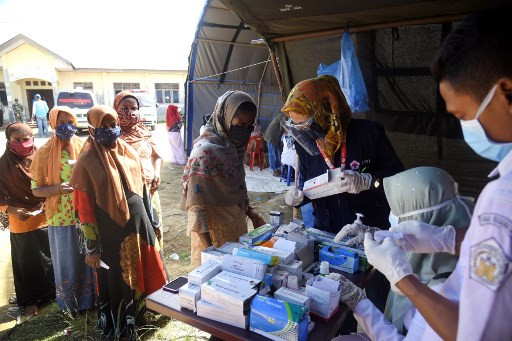Popular Reads
Top Results
Can't find what you're looking for?
View all search resultsPopular Reads
Top Results
Can't find what you're looking for?
View all search resultsIndonesia appeals for end to Rohingya crisis
Indonesia has again called on Myanmar to work out its plan to repatriate thousands of Rohingya refugees and address the root cause of a refugee crisis that has spilled over into the rest of Southeast Asia.
Change text size
Gift Premium Articles
to Anyone
Indonesia has again called on Myanmar to work out its plan to repatriate thousands of Rohingya refugees and address the root cause of a refugee crisis that has spilled over into the rest of Southeast Asia.
Hundreds of stranded Rohingya refugees landed on Indonesian shores just a day before the top diplomats of ten-nation ASEAN virtually convened to thrash out a collective stance on various issues, including the refugee crisis.
At the 53rd ASEAN Foreign Ministers' Meeting (AMM), Indonesian Foreign Minister Retno Marsudi expressed her concerns over the ongoing crisis in the region and underlined the need for ASEAN to address the root cause of the problem.
She urged Myanmar as well as the ASEAN Secretariat to provide an update on efforts to ensure a voluntary, safe and dignified return of the Rohingya minority to Myanmar’s Rakhine state, where they originate.
“Without it, we are very concerned that this will happen again and again and it will never be resolved if we can’t solve the core issue,” she told reporters in Jakarta on Wednesday evening.
Out of humanitarian considerations, Indonesia rescued and took in a total of 395 Rohingya refugees who were stranded in cramped boats at sea. The first group of refugees was rescued by local fishermen in Aceh province on June 24, while the second arrived early on Monday. Countless others have arrived and left Indonesia over the years.
As many as 30 refugees are said to have died at sea, while a Rohingya man and woman have died in the hospital from respiratory illness, news agency Antara reported.
More than 750,000 ethnic Rohingya have fled to Bangladesh after Myanmar security forces launched in 2017 a heavy-handed crackdown on the minority that has since attracted strong and widespread criticism.
Naypyidaw insists it was dealing with a local terrorist threat, but various investigations paint a very different picture of the handling of an ethnic group that the Buddhist-majority country denounces as stateless.
Read also: Myanmar army tries to discredit Rohingya abuse confessions
Dire conditions in the refugee camps of Bangladesh have sparked an exodus into other countries, often using people-smuggling networks.
After being criticized for its slow response to the crisis, ASEAN, through its humanitarian assistance agency, the AHA Center, promised to lead a regional response to help Myanmar repatriate the refugees, although repeated attempts in recent years have largely failed.
Myanmar officials have insisted that the situation in Rakhine was becoming increasingly complicated due to the worsening of the COVID-19 outbreak and that the country was gearing up for an election set for November.
Reuters reported that Myanmar had gone weeks without any local viral transmission and that many regulations had been relaxed until mid-August, when cases were detected in the western state of Rakhine.
The number of cases there has since tripled to 1,562 and eight deaths. The health ministry reported 93 new cases on Tuesday.
In the 53rd AMM joint communiqué released on Thursday, foreign ministers reaffirmed support for “a more visible and enhanced role of ASEAN” and reiterated the need to find a comprehensive and durable solution to address the root causes of the conflict.
The ASEAN ministers “stood ready” to facilitate further dialogue between Myanmar and Bangladesh and the full implementation of a repatriation arrangement agreed by them in 2017, as well as implementation of the remaining recommendations of the Advisory Commission on Rakhine.
“We stressed the importance of and reiterated our continued support for Myanmar’s commitment to ensure safety and security for all communities in Rakhine state as effectively as possible and facilitate the voluntary return of displaced persons in a safe, secure, and dignified manner,” they stated in the negotiated outcome document.
Meanwhile, Malaysian Foreign Minister Hishammuddin Hussein said that a prolonged Rakhine crisis would jeopardize the security and the stability in the ASEAN region.
“We are closely following the irregular movement of Rohingya refugees from Rakhine state and Cox’s Bazar via land and water routes. What we do not wish to see is a repeat of the 2015 boat people crisis in the Andaman Sea,” the minister said in a circulated statement after the meeting.
Both Retno and Hishammuddin urged ASEAN countries to work together in addressing transnational crimes, particularly people smuggling and trafficking, as Rohingya refugees are deemed its most vulnerable victims.
“The transnational crimes of illegal Rohingya in the region require utmost attention by all ASEAN member states, especially the littoral states to the Andaman Sea and the Straits of Malacca. These crimes were enabled by the perpetuation of the crisis in Rakhine state, which sees no foreseeable resolution even after more than two years since the onset of the crisis in 2017,” Hishammuddin said.
The region is now faced with the challenge of more sophisticated methods of trafficking.
Read also: UN calls out failure of Bali Process to save refugees
According to a recent report by Institute for Policy Analysis of Conflict, the trafficking methods used in the last two boatloads were very different from the spontaneity of the 2015 refugee boat crisis, citing an investigation by Aceh’s Commission for Missing Persons and Victims of Violence (Kontras).
Medical evaluations of the refugees show that almost all of the refugees were relatively hydrated despite being at sea for months, indicating that the smugglers ensured they were fed through a shuttle system of smaller fishing boats going back and forth to replenish supplies.
“According to the testimony of one of the four Malay speakers in the June group, each person paid 10,000 Malaysian ringgit (US$2,400) for boarding the boat. Additional payments are expected from their relatives in Malaysia,” the report noted.
In the past, traffickers would require payment upon arrival, but in some recent cases, they demanded transfers of 5,000 ringgit before the victims left the boat.
Editor's note: The article was updated to include passages from the ASEAN joint communiqué.








